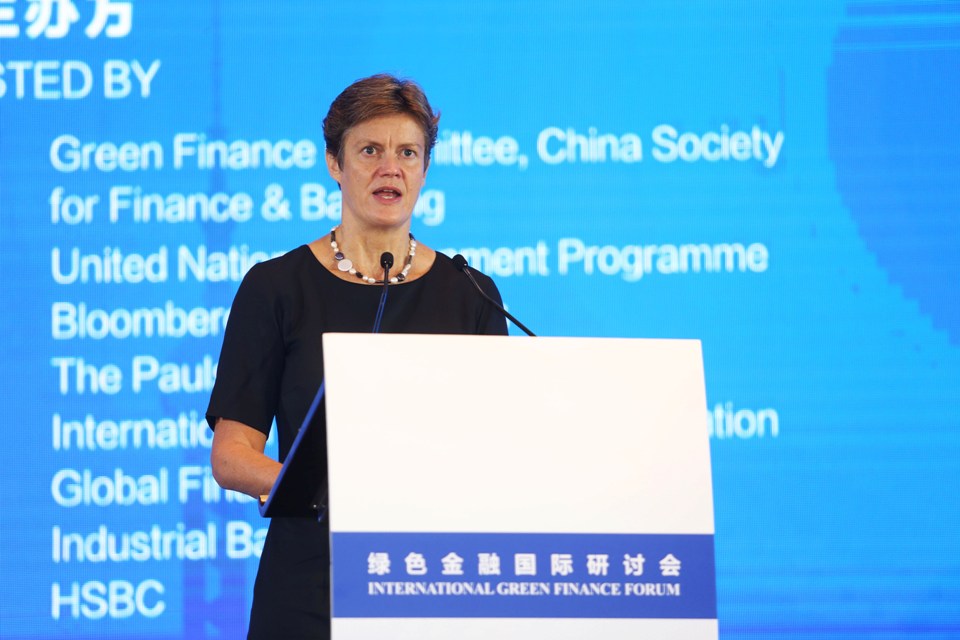G20: how UK-China cooperation is greening global financial flows
Barbara Woodward, British Ambassador to China, delivered a speech at G20 Green Finance Conference Shanghai on 6 September.

Thank you Dr Ma Jun for the introduction and the kind invitation to take part in today’s conference. Deputy Governor Yi, Ladies and gentlemen good morning!
Eight months ago I had the privilege of hosting Dr Ma Jun, the Bank of England, UNEP and 50 G20 delegates for the first green finance study group meeting at my residence in Beijing. This was very much at the start of their G20 journey and having just seen the issuance of the first domestic Chinese green bond, there was a real sense of exciting potential. Today I am delighted to have the chance to catch up with them again; this time in front of an even larger audience.
Many of you are financial market experts; I won’t claim to be one. But from my position in government, there are at least four reasons why this G20 study group has been important.
First, it illustrates how Chinese leadership on the environment and finance can be transformational. The impact of China’s move on green finance has been global. This is a function not only of the G20 process, but also of the strong domestic policy support in China including, as we just heard, from President Xi himself, which has led to the rapid growth of China’s domestic green bond market – which looks set to be larger in 2016 than the entire global market was in 2015. I was also present last year in London during President Xi’s State Visit to the UK which saw the launch of China’s first overseas RMB green bond.
All of this is the result of the leadership shown by the PBoC and by Deputy Governor Yi and Dr Ma in particular. One only has to glance at the range of speakers in today’s programme to know that the eyes of the world’s financial community are on you and what happens here also influences green financial markets well beyond China’s borders.
Second, the Study Group has broken new ground. For years there were two international groups working on sustainability. One concerned with the stability of financial system, another with our environment. Yet these two groups hardly ever met. The G20 process, together with the FSB task force, has been instrumental in changing this. Governors of central banks are now linking pressing environmental problems with financial system stability. This has not happened before. Connecting the dots, introducing new ideas to address global problems and building consensus amongst the world’s 20 leading economies are exactly what the G20 is designed to do. And this study group has been a model of successful G20 cooperation.
Third, we all have a shared interest in seeing green finance in China succeed. Sustaining growth requires addressing pressing environmental problems.
This presents both risks and opportunities. Air pollution is a serious issue facing many cities. This is indeed important, but it is not the only environmental threat we face. It is becoming increasingly clear that we have entered a new age of extreme weather. Climate change has changed the odds on these events and this means that the UK and China share a strong mutual self interest in tackling local and global environmental problems together.
But more than this, the UK as an outward looking country has a strong desire to work actively together with our strategic partners, like China, as well as leading international institutions, like UNEP, on important global issues.
We are delighted that the Bank of England has co-chaired this study group. The Bank published a landmark review of climate change and insurance last year. The Governor Mark Carney has also spoken out on the risks of climate change to financial stability. This has led to the establishment of the Financial Stability Board Carbon Disclosure Task Force and in parallel a City of London and UNEP, in conjunction with the British Government, has established a UK green finance initiative, which is making recommendations for how the UK can grow this important sector.
Fourthly, there is still more to do. Another important contribution that the study group has made is to identify, at the G20 level, five market barriers that are blocking the flow of sustainable finance and offer practical suggestions for what can be done to address them. I won’t list these here, as I am sure you will be hearing about them during the course of the day, but I did want to underline the role of the study group in providing valuable insights and plotting a path forward.
From a standing start just two years ago the partnership between the PBoC, the Bank of England and the United Nations Environment Programme has really moved at speed and has already had a global impact; allow me to congratulate them on their contribution to the G20.
Before I finish, on behalf of the UK co-chair, the Bank of England, I would like to make an announcement. The work of the co-chairs has inspired the Bank of China to issue a new landmark green covered bond, which will be listed on London Stock Exchange. Michael Sheren from the Bank of England will be explaining more about this exciting new class of green bond later in the programme.
My thanks once again to our hosts the China Green Finance Committee. I wish this conference every success.